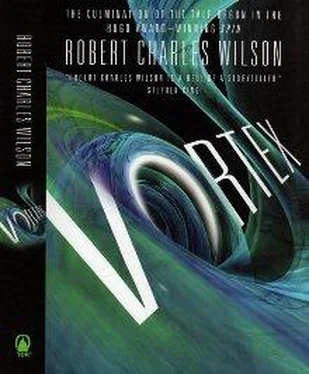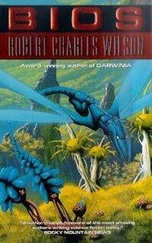“I don’t know.” Peut-être. “We all fall. We all land somewhere.”
“You have a long trip ahead of you.”
“It won’t seem long to me. I’m traveling light.”
“You carry what you carry,” Turk Findley said.
* * *
I enclosed the city in its bubble of slowtime and borrowed sunlight for acceleration. Vox Core soared beyond the orbit of the system’s outermost planet, out into the interstellar vacuum and far from Cloud Harbor. From my vantage point this took only a moment. The city’s clocks ticked seconds for centuries.
I had no destination. Occasional brushes with massive stars skewed my trajectory in unpredictable vectors, a drunkard’s walk through the galaxy. Apart from avoiding obstacles, I did nothing to intervene.
In the physical body of Isaac Dvali I often wandered the tiers and passageways of Vox Core. The city persisted in its daily rhythms, regulating its atmosphere, tending its empty parks and gardens. On these walks I occasionally passed robotic maintenance machines as they rolled down public passageways, steel monks hurrying to their matins. They resembled people but they lacked moral agency, and I resisted the unreasonable urge to speak to them.
It was a pointless anachronism to preserve the cycle of day and night, but my mortal body preferred it. Days, I basked in artificial sunlight. Evenings, I read ancient books reproduced from the Voxish archives, or reread the memoirs Turk and Allison had left me.
Nights, while my body slept, I expanded my sense of self to include all of Vox Core. I modeled the aging galaxy and my place in it. I tapped trickles of information from the ever more complex skein of the Hypothetical ecology. Stars that had been young only moments ago exhausted their nuclear fuel and decayed into simmering embers: brown dwarfs, neutron stars, singularities in their bottomless graves. Compared to the passage of time in the exterior universe, my consciousness was vast and slow. This would have been the true viewpoint of the Hypotheticals, I imagined, had the Hypotheticals possessed a unitary consciousness.
Signals propagating at the speed of light passed between stars as quickly as one neuron communicated with the next in Isaac Dvali’s mortal brain. I began to become aware of the galaxy as a whole form, not just a collation of stellar oases separated by light-years of emptiness. Hypothetical networks ran through it like fungal hyphae through a rotten tree. In my night vision I saw this activity as threads of multicolored light, revealing a complex and otherwise invisible galactic structure. Thriving world-rings stood out like the closed chains of carbon atoms in an organic molecule. Ancient, dead rings shimmered like pale ghosts as the Hypothetical machines associated with them died for lack of resources or scattered to nearby stellar nurseries.
The living galaxy pulsed with exhaustion and renewal. New technologies and energy sources were discovered, exploited, shared.
And as the universe aged and expanded, other galaxies, already immensely distant, fled toward the limits of perceptibility. But even these faint, far structures had begun to reveal a hidden life of their own, emissions of stray signals suggesting they had evolved their own Hypothetical-like networks. They sang like unintelligible voices in the darkness, fading.
* * *
It was inevitable that I would have to abandon my mortal body and live exclusively in the processors of the Coryphaeus and in the cloud of Hypothetical nanotechnology surrounding Vox Core. But I still wanted to be able to move about the city in a physical way. So—as I allowed the body of Isaac Dvali to lie in a self-induced coma, dying of starvation—I fashioned a more durable substitute, a robotic body equipped with equivalent senses, in which I could instantiate my consciousness. When this project was complete I gathered the remains of my organic self in my inorganic arms and carried the corpse to a recycling station, feeding its useful proteins into the closed biochemical loops of Vox Core. I felt no remorse or grief, and why should I? I was what I had become. The fragile meat in which the message of myself had first traveled to the stars, the old somatic galaxy in its border of skin, I gladly fed to the city’s forests.
Vox Core wasn’t an entirely self-sufficient system. I was forced to harvest trace elements from stellar nebulae in order to replenish what couldn’t be recycled. Of course, in the long run, Vox Core was as mortal as all baryonic matter, even inside its temporal fortress. It was only a question of time.
* * *
I courted the end of all things.
Vox Core fell into a long elliptical orbit of the galactic core. I began to divide my awareness into saccades, moments of perception separated by long periods of inactivity, so that experiential time passed more quickly, even inside the temporal bubble surrounding Vox Core.
Entropy—in the form of broken chemical bonds, irreparable system failures, radioactive decay—gnawed at the city’s vitals. Blight and drought decimated the forests and rubble began to obstruct the public walkways. Maintenance robots expired for lack of maintenance. Atmospheric regulators—the city’s lungs—gasped and finally failed. The air of Vox Core would have been toxic, had there been anyone alive to breathe it.
The quantum processors of the Coryphaeus continued to function, protected by multiple redundancies. But that, too, was only temporary.
The universe grew colder. The galaxy’s stellar nurseries, the concentrations of dust and gas that gave birth to stars, had grown too thin to be fecund. Old stars guttered and died and were not replaced. The Hypothetical ecology retreated from this encroaching darkness to the galaxy’s dense core, harvesting the gravitational gradients of massive dark holes for energy.
And something else happened to the Hypothetical ecology as it sheltered in the galaxy’s still-beating heart: its information-processing mechanisms were co-opted and dominated by sentient species seeking to outlive their organic mortality. These rogue virtualities grew, encountered one another, and in some cases merged. (The human species was the source of one such sentient bloom, though its virtual descendents could hardly be called “human” in the classic sense.) Pools of post-mortal sentience began to cooperate in a collective decision-making process—a kind of cortical democracy, on a scale of light-years. The dying galaxy began to generate unitary thought.
None of these thoughts could be rendered in conventional language, though my larger self understood them, at least approximately.
I took a last walk in my robotic body through the ruins of Vox Core, its towers fractured and askew, its vast tiers dark or tremblingly half-lit. Vox had sailed the seas of several worlds, and was sailing now on the largest sea of all, but soon I would have to abandon it. I had already begun relocating my memories and identity to the cloud of Hypothetical nanodevices, which was linked in turn to the remaining Hypothetical networks, all powered by the dynamos of ancient singularities.
And even that last redoubt of order and meaning was doomed. Soon enough, the same phantom energy that had inflated the universe would unravel matter itself, leaving nothing but a dust of unbound subatomic particles. Then, I thought, the darkness would be absolute. And I could sleep.
But for now, Vox Core sailed on. Vacuum invaded its faltering defenses. Empty, it succumbed to emptiness. In the absence of induced gravity, its contents began to spill through breached walls into space.
Beyond it, outside of it, my somatic boundaries expanded disconcertingly.
* * *
The Hypothetical network grew denser and more complex as its virtual polities applied immense calculating power to the problem of survival. Gravitational anomalies suggested the existence of megastructures larger than the event horizon of the universe itself—shallow gradients of ghostly energy that might serve as a medium to carry organized intelligence out of the entropic desert. But how, and at what cost?
Читать дальше












